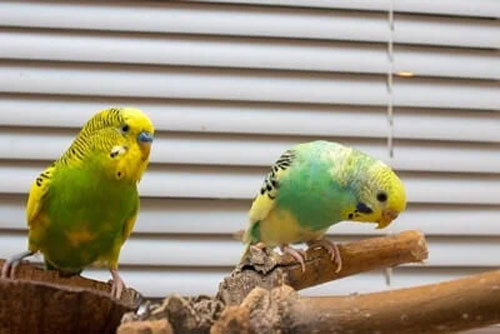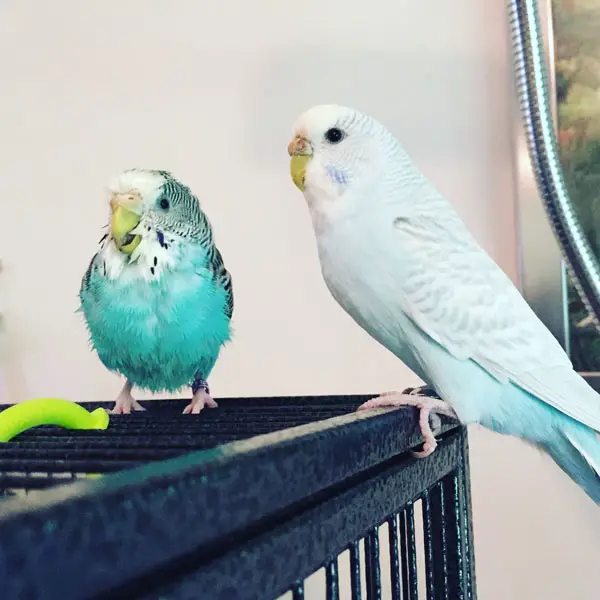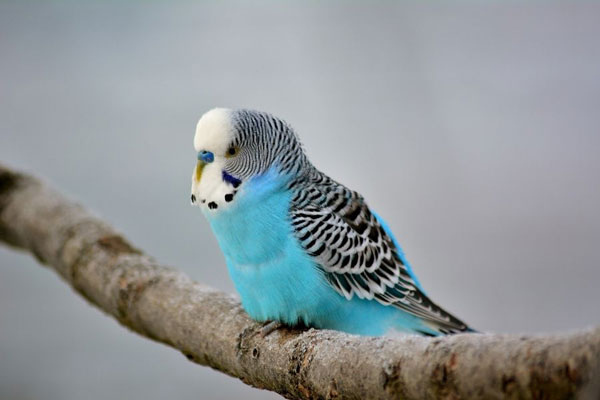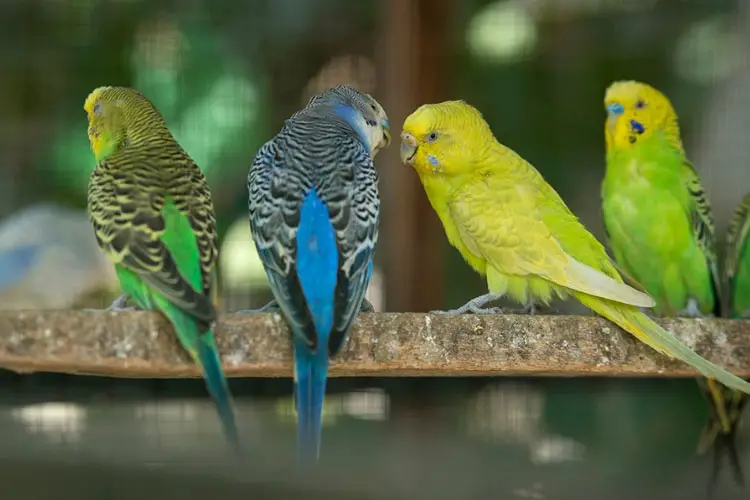Budgies use their beaks for various activities like preening their wings, tails, and sometimes other birds in the flock. However, not every part of their body is accessible by their beaks, and they must use the surrounding environment. Preening is important to the birds as they spread the preening oils necessary for Vitamin D3.
So, why do budgies rub head on perch? Budgies rub their heads on perch for various reasons like scratching, grooming, and cleaning. The scratching might be due to irritation, molting, mites, and stress. Providing extra baths, cleaning the cage, or adding a new pet can help solve this issue.
The parts your budgie is rubbing and how hard its scratching will determine the reason and how you can help. Read more for an in-depth insight into this topic.
Why Is My Pet Budgie Rubbing Head on Perch?
While preening, budgies depend on the environment or other pets in the flock to access the hard-to-reach parts. In some cases, your pet will be rubbing the back of its head or just above its cere. The intensity of the rubbing can also help determine the reason, with the high-intensity levels signifying possible problems. Below are various reasons your pet budgie is rubbing its head:

1. Scratching
Your pet bird might rub its head on the perch for head scratches which is normal behavior. The rubbing intensity while scratching is low and infrequent. If the pet is scratching more intensely, it might signify the presence of mites in your bird’s cage.
2. Irritation
A budgie pet with skin irritation will rub its head on the perch. The irritation might be from an infection, allergies, or parasites. A sign of these irritations is when the bird stops playing or feeding to rub its head.
3. Boredom
A bored pet will sometimes rub its head on its perch as a fantasy of having its head preened. The intensity of this rubbing is low and doesn’t interrupt feeding or playing. If the bird has other mates in the cage, then it might be just a regular habit.
4. Molting
Budgies can molt up to three times a year in the wild and one or two times in captivity. When this period approaches, the bird will intensely scratch its head on the perch due to itchiness.

Also read: Why Does My Budgie Keep Facing the Wall?
What To Do If Your Pet Is Rubbing its Head On the Perch
It’s a habit of birds to rub their head while preening and grooming themselves. However, if the rubbing is more intense and frequent, there is a need to investigate and take action. Below are various things you can do when your pet is itchy.

- In instances where you suspect there are parasites like Knemidocoptes mites, clean the cage thoroughly using warm water and vinegar. You might also need to remove nests out of the bird’s cage before spraying the insecticides.
- Serving your pet diets with vitamins A and beta-carotene can help keep your bird healthy and safe from allergies. Also, regularly changing the air filters can help keep the environment free of allergens that might be causing itching.
- If you suspect your social bird is bored, frequently interacting with the bird can help reduce its head-scratching time. You can also consider adding another budgie pet to reduce your pet’s boredom and help in preening.
You can only handle your itchy bird if the situation is not bad. However, if they are bleeding and still trying to rub their heads further, you’ll need a vet’s urgent intervention. Sometimes the problem may not be resolved by applying medication alone.
If the budgie has internal parasites triggering the itching, you’ll need a vet to administer ivermectin. It may be a bit pricey, but it’s the best way to address the issue for good.
How to Help a Molting Budgie
Occasionally, your pet bird will go through the molting cycle, a period when it will shed its feathers and grow new ones. If your pet has itchiness, you can help it scratch its head using your fingers if it allows you. It’s also advised to check on their diet during these periods and provide food high in calcium, protein, and iron.

You can also mist the budgie regularly using a spray bottle to provide more humidity. Avoid petting your bird often so as not to break its new blood feathers. Providing extra bird baths can also reduce the bird’s itchiness and keep the dry skin humid.
FAQ
When beloved pets are doing unusual activities, it’s only natural for the bird owners to be worried. Sometimes, these activities like head rubbing are not life-threatening as the pet is undergoing a normal molting cycle. Below are frequently asked questions on this topic and their answers.
Budgie’s head rubbing activities can be motivated by various things like self-soothing or when self-grooming. A normal rubbing will be less intense, and the bird will be undergoing other preening activities. A budgie rubbing its head on a person’s hands or fingers is a sign of affection.
A bird scratching its head much can be a sign of an underlying problem. In a normal scratching, the bird will be spreading preening oils all through its head. Sometimes during molting, the bird will also frequently scratch its head on things. Constant scratching, however, should get you to call your vet to examine it.
Your budgie rubs its head on you to seek attention. They may be showing affection and communicating a love message, but this is not always the case. The best response you can give is to play with it. If it insists on rubbing the head and not playing, try to evaluate their body for any signs of sickness or mites.
Related: How to Comfort a Dying Budgie?
Conclusion
Preening activities in birds include head rubbing as the birds access some hard-to-reach parts of their bodies. It’s healthy behavior for birds to regularly rub their heads as they go through their daily grooming activities. Reasons for head rubbing include stress, irritation, parasites, allergies, and Molting.
A molting bird goes through severe itchiness at the feather loss period, where new pin feathers grow. During this time the bird will severely rub its head on the perch and other hard parts of the cage. Helping a molting budgie pet includes a diet rich in calcium, proteins, and sometimes extra bird baths.







